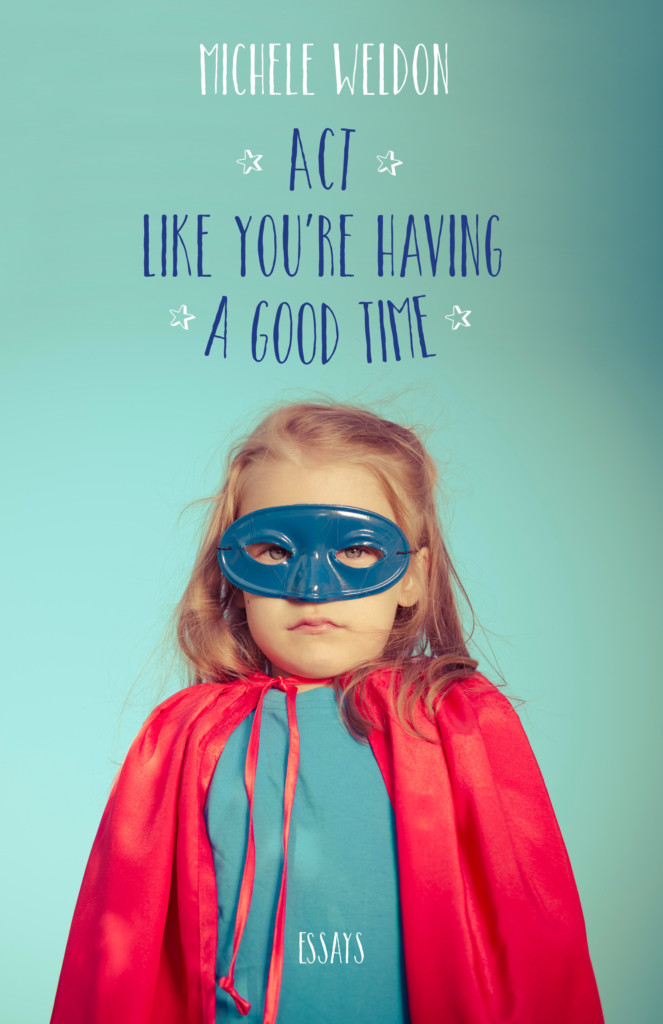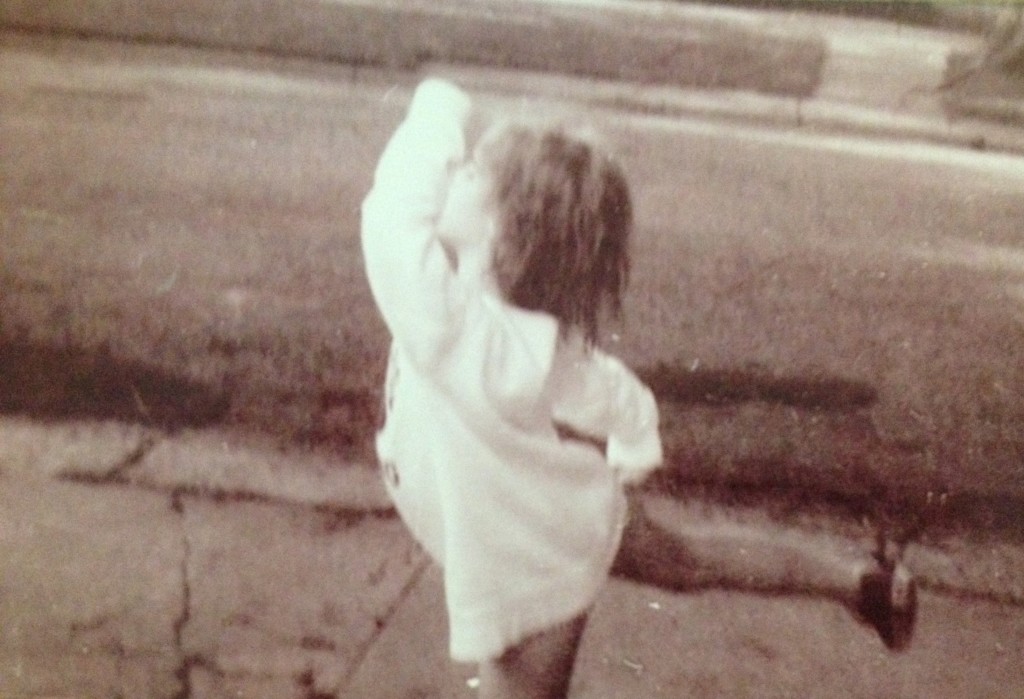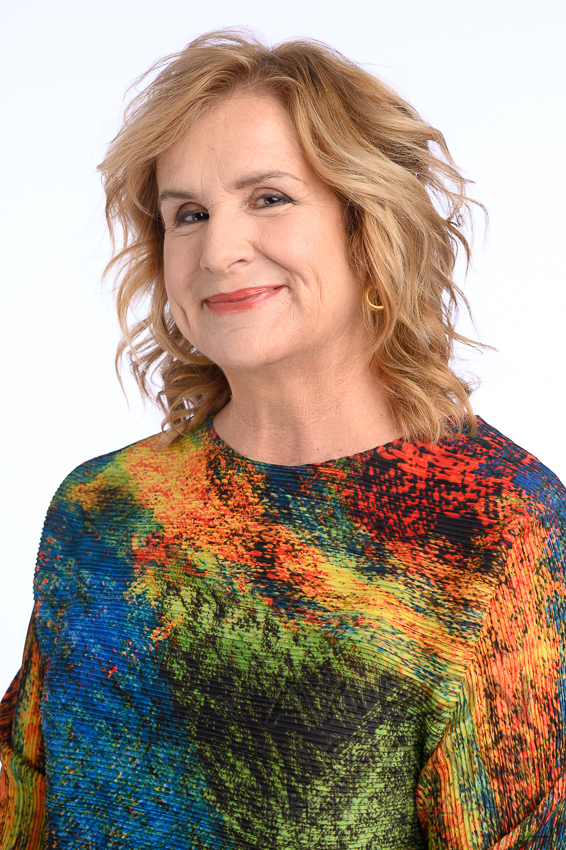“Act Like You’re Having A Good Time” is my sixth book but first book of essays; odd since I have been writing essays for more than four decades. I wanted to tackle in this book the issues and discoveries I have been facing as a mature woman in the workplace and in a chaotic culture where invisibility, erasure and injustice confront so many. Tackling the notions of privilege, purpose, friendship, faith, home, fashion and work, I felt it was critical to be honest about not having simple answers. I do not declare 10 steps to purpose or 15 ways to lead your best life. I wanted to open the door to inquiry, and to assert that sometimes just asking the questions is an answer. The essays in this book look back to the past, ahead to the future and are planted in the present, hopefully giving a sense of movement and growth, not just life in the status quo.

As a girl I was devastated when a playmate at the local pool scolded me that I was “so full of myself.” I felt deflated and hurt, until my mother soothed me, saying, “Why would you want to be empty of yourself?” It serves as a lifelong reminder that all of us can live better lives with purpose and ambition, aiming to reach our potential, undeterred by superficial criticism and negative judgment by others.

Below is Chapter 13, “Full of Yourself” — an exclusive for Better readers.
I never felt invisible before as I do now at times, not as a child, especially not as a child.
Running to the basement of the house where my mother was doing laundry most all of the time, I did not even ask her if she wanted to listen, just jumped into performing the song I wrote for her on the viola. In fifth grade, I was terrible at the viola. The bow screeched across the strings because I was too impatient to apply the rosin before each practice session. No doubt the song was intolerable as well; she never said as much.
I wanted her to hear me. To see me. She did.
My viola playing was not just a little bit not so good but nails-on-a-chalkboard torturous because I never held the bow the way the instructor showed me to or used the right amount of pressure to elicit the smooth melody, but my mother never told me that. And I never believed I was really bad at anything, which can be a curse when you’re growing up. You have this bubble around you that you think will protect you from the world, but it won’t, not really. You find out eventually.
It wasn’t that my parents gorged us with a false sense of bra- vado about everything, but they did oblige us all with acknowl- edgements regularly and praise, lots and lots of praise. Favorite dinners for excellent report cards, hugs and rewards from the small dessert to the larger permission to do something longed for—like a horseback riding class an hour away.
My father’s nickname for me in first grade was “VG,” for “Very Good,” which is what I got on my report cards, the early ones that didn’t bear grades.
I was born in the generation before they gave out trophies to preschoolers for showing up at soccer practice. My parents were conjoined in pumping each of us up, with the expectation that we would succeed; never punishing us severely for failures but always positively reassuring that it will just take time and prac- tice. We were rewarded for trying. I never got better at the viola. I never got better at swimming or any other sport, I just moved on to other things, I guess when I realized I was not very good. Actually when I realized I was very bad.
You eventually understand that what your parents adore in you is specifically why people think you are full of yourself.
“You are so full of yourself, Michele Weldon,” a girl with freckles and a mean streak said to me the summer of 1964 when I was six.
We were standing by the concrete side of the Riverside swim- ming pool one July afternoon and I was going on and on about how I would be a famous writer one day after I had reached my peak as a famous ballerina. I was wearing my bright blue swim- suit, dipping my toe in the water with a swish and a splash, put- ting on my bathing cap with a snap.
She squinted at me in disdain, waiting for my response.
I stayed silent, wondering why would she be so mean. I had never been mean to her.
She stormed off when I didn’t cry or react the way she thought I would, I guess with an apology and an eruption of tears. But I just stared at her, thoroughly perplexed, wondering why she would say such a thing. Susan didn’t talk to me the rest of that afternoon nor the rest of the summer nor the five sum- mers after that. It was awkward and it did make me feel bad after all, but I never let on to her.
I asked my mom about it later that night, after the dishwash- er was turned on following dinner and everyone had disap- peared to their rooms or out to the backyard for the last gasps of a summer night.
“Well, why would you want to be empty of yourself?” my mother asked.
Now, that made sense. You want to be full, like a lunch box headed to school, like a gas tank before a road trip, like an enve- lope from a pen pal across the world. I love that line so much, I use it in seminars and used it often in my university classrooms. I am considering painting it on my bedroom wall.
My mother said that a lot. To my brothers, Bill and Paul, and especially to my sisters, Mary Pat, Maureen, and Madeleine, and me, who had our share of mean girls to contend with over the years, the ones who told us we would never be OK.
No one likes you. He doesn’t like you. You’re not pretty. You’re not smart. You’re fat. You’re weird. Everyone hates you.
“They’re just jealous,” my mother would say.
How you are perceived is separate from who you are; the reaction to you is out of your control. No, you should not be a braggart, a brat, self-conscious—that’s a sin. But if you are doing what you enjoy, harming no one else, you are not respon- sible for how people take you. That, I later discovered, is not how most people my age were raised.
Pre–social media, a lot of the verbal judgment and cruelty thrown at me was about what I looked like. Spared the racial- based harassment, I was mocked for what I wore. Most everyone was. If you wore the wrong thing, accidentally, thinking that a pink sweater vest was the coolest thing in the world, only to find out that pink sweater vests were dorky, or that if you did not have the right winter coat or brand of hat or if your pants were not tight enough or low enough, then you were nothing. Nothing. This is why Glamour Don’ts resonated.
But it was one moment that passed and not one that lived for- ever digitally or went viral.
If you wore something too short, too tight, too flashy, too baggy, too old, too uncool, then you were dismissed, taunted. What you put on your body bred acceptance.
My mother would have none of that: You wear what you like. You be who you are.
If I came home from school and repeated a mean comment, my mother would say, “It’s like a dog barking at you. Would you cry if a dog barked at you?”
“Don’t let it get to you, Mich,” my father would say in shorthand.
At home, I felt seen. I felt loved—even in my teen years when I was sneaky and they didn’t see me when I sometimes poured vodka from the liquor cabinet into a cough medicine bottle that I had emptied into the bathroom sink to bring to high school dances and share hurriedly with a half dozen friends outside the school. I knew it wouldn’t be OK if my parents knew what I was doing—drinking or hiding cigarettes in my socks. But I also knew that I could teeter off toward the edge because I was tethered and I would not get lost. Or fall off. They would see me.
And I know now I am incredibly fortunate that nothing trau- matic ever came from any of my daring. I was not harmed. I was lucky to be unscathed—so many other girls like me were not.
I wanted to be noticed. I wanted my parents to notice me. I wanted my brothers and sisters to notice me. I wanted girl- friends to notice me to invite me over to play at their houses so we could dance in the basement to 45s on the record player. Later I wanted boys to notice me, to like me, to hold my hand, to tell me I was pretty, to call me on the yellow house phone in the kitchen.
I did not want to be forgotten. I wanted to be known for something, something that was mine. It was not the viola, as it turned out. It was not any sport. It was not singing or dancing, even though I took lessons, or math.
It was writing.
It’s why I wrote poems and gave them to my parents. It’s why I entered contests for writing. It’s why I tried so hard, and when I won, my mother would say, “Of course you did!”
It’s why the whole family and my fifth-grade teacher, Miss Daus, went to the Palmer House for the 1968 Father of the Year awards dinner because I wrote an essay about how my father was so simple and kind and was one of ten finalists. It’s why years later, my father kept all the newspaper clippings from my articles in the college newspaper, then later the ones in newspa- pers and magazines, in a drawer by his bed.
Once when I was home visiting after college, he was lying on his bed in his blue pajamas in their bedroom with the blue and silver wallpaper, reading a magazine with one of my bylined stories in it. He looked up, and all I could see were his big black framed glasses and the biggest smile.
“This is really something, Mich.”
I hear him saying that in my head still.
Please join Weldon for a virtual event on Sunday, November 8 at the River Forest Public Library.
More From Better:

Michele Weldon is an award-winning author, journalist and emerita faculty in journalism at Northwestern University, where she taught on the undergraduate and graduate levels for 18 years. She is the author of six nonfiction books, including her latest, “Act Like You’re Having A Good Time: Essays,” She has contributed chapters in seven other books.
Her first book, “I Closed My Eyes,” (Hazelden, 1999) was reprinted in seven languages and was featured with the author on “The Oprah Winfrey Show” in 2002. Her other books include ”Wriiting To Save Your Life: How To Honor Your Story,” (2001); “Everyman News: The Changing American Front Page,” (2008); the ebook and audiobook, “Just Me and My Three Sons” (2012; and “Escape Points,” (2015). She recently won a 2020 Peter Lisagor Award from the Chicago Headline Club for Best Essay for essays that appear in her latest book.
Her essays have appeared in New York Times, CNN, Washington Post, TIME, OZY, The Guardian, Slate, Chicago Tribune, Better, Forbes, USA Today, NBC Think, Narratively, Cosmopolitan and scores more. She has delivered more than 200 keynotes and appeared on TV, radio and digital outlets globally.
A senior leader with The OpEd Project since 2011, she has led Public Voices Fellowship initiatives at Northwestern, Stanford, Princeton, Brown, Loyola, DePaul and Rush universities, the Ms. Foundation, the McCormick Foundation, Boone Family Foundation, Center for Global Policy Solutions and Urgent Fund Africa. She is the award-winning editorial director of Take The Lead, a global women’s leadership initiative, and received a 2020 Chicago Journalists Award for Best Independent Blog for her work there in 2019.
A graduate of Northwestern University with a bachelors and masters in journalism, she serves on the advisory boards of Global Girl Media Chicago, Sarah’s Inn, Beat The Streets Chicago, Between Friends and Children’s Foundation. She is a former member of the board of directors of Journalism & Women Symposium and is the mother of three sons.
